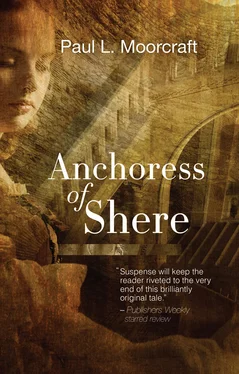Paul Moorcraft - The Anchoress of Shere
Здесь есть возможность читать онлайн «Paul Moorcraft - The Anchoress of Shere» весь текст электронной книги совершенно бесплатно (целиком полную версию без сокращений). В некоторых случаях можно слушать аудио, скачать через торрент в формате fb2 и присутствует краткое содержание. Жанр: Триллер, на английском языке. Описание произведения, (предисловие) а так же отзывы посетителей доступны на портале библиотеки ЛибКат.
- Название:The Anchoress of Shere
- Автор:
- Жанр:
- Год:неизвестен
- ISBN:нет данных
- Рейтинг книги:4 / 5. Голосов: 1
-
Избранное:Добавить в избранное
- Отзывы:
-
Ваша оценка:
- 80
- 1
- 2
- 3
- 4
- 5
The Anchoress of Shere: краткое содержание, описание и аннотация
Предлагаем к чтению аннотацию, описание, краткое содержание или предисловие (зависит от того, что написал сам автор книги «The Anchoress of Shere»). Если вы не нашли необходимую информацию о книге — напишите в комментариях, мы постараемся отыскать её.
The Anchoress of Shere — читать онлайн бесплатно полную книгу (весь текст) целиком
Ниже представлен текст книги, разбитый по страницам. Система сохранения места последней прочитанной страницы, позволяет с удобством читать онлайн бесплатно книгу «The Anchoress of Shere», без необходимости каждый раз заново искать на чём Вы остановились. Поставьте закладку, и сможете в любой момент перейти на страницу, на которой закончили чтение.
Интервал:
Закладка:
The bishop was a short, portly man, and Duval interpreted his superior’s dedication to the manly world of sport, albeit as a passive spectator, as a symptom of the small- man complex; “a Wisden Napoleon” Duval was pleased to observe in his diary. The priest found Templeton’s obsessions trifling and endured the counselling sessions with poor grace. Templeton, he thought, might have made a good, self-indulgent Anglican bishop, but he rated him poorly as a Catholic. His superior talked about theological possibilities, not faith; religion had become mere philosophy. The bishop would thus never comprehend his subordinate’s sense of spiritual mission, even if Duval deigned to try to explain it.
Nothing mattered to Duval except Christine, and she was slipping away from him. Yet there was little he could do. Duval felt utterly compelled to recreate her history, and that compulsion spurred on his faltering steps towards his literary antiphon.
1330
Christine’s first winter in her anchoress’s cell was the coldest Surrey had ever known. The oldest cottager in Shere, Ranulf the Miller, stiff with rheumatism at sixty-eight, swore to that. Yet despite the severity of the season, Sir Richard was not generous in granting permission for the villagers to gather kindling in the Hurtwood. Some of the sheep which had been brought from the North Downs perished from the cold, even when they were allowed to graze in the water-meadows of the valley. In January and February snow fell a foot deep on the hills and the Tillingbourne froze over. Even Christine accepted an extra coverlet and hide boots from her father, once Father Peter had given his leave.
William could see his daughter succumbing to the cold, and shared his concerns with the priest.
“The Holy Spirit can warm the heart, but not always the feet,” Father Peter told William. “She is attendant to all her devotions, but her health is not as strong as her will.”
“Cannot God’s mercy be extended to my child?” pleaded William. “The mercy of just one visit to our hearth, where fire and meat can heal her soonest? Margaret, my daughter at home, cannot bear to see her sister freezing in the wall.”
“Leave she cannot, William,” said Father Peter earnestly. “To permit her to leave her cell-unless to see a doctor when she is nearest death or for me to give a final sacrament-is beyond me, and the bishops. Were she to leave, only our Holy Father the Pope could grant her rights of return. You know that she cannot break her solemn vows. Would you have her excommunicated and her soul consumed in the fires of Hell? But she should take meat.” Father Peter’s face betrayed his concern for his charge. “She fasts without my leave and I have told her this.”
William replied sadly, “My wife or I do attend her every day after Matins. She takes her drege, the best mix of barley and oats that her mother can make. Some cheese, too, and pease porridge. And buttermilk she enjoys. Her salted beef she refuses. Fruit she asked for in the summer…such unhealthy food…and now she begs us bring roasted nuts. Speak to her, Father, on this matter. She will parley but little with me except to know a word or two of her brother and sister. I speak of matters spiritual, as is right, but sometimes her voice is weak…” William broke off, his anxiety about his daughter and yet his desire to do right by the Church all too evident.
The priest patted William’s hand. “I pray for her each day, Will, but she is in God’s heart. I must confess to you that she is much near to Him. I could not reach that grace that she possesses.”
“But, Father, must she die of cold to prove her grace?”
“If she dies, Will, no purgatory waits for her. See the Doom painting, the Final Judgement, painted there above our church door? Ascend she will to God’s right hand. She will be free of our earthly cares.”
“Aye, Father,” said William, “and free of one mighty care-Mistress de Kempis of Peaslake.”
Father Peter smiled. Anna de Kempis, a wealthy widow, was renowned in the villages of the Hurtwood, and beyond, because she claimed to have the “gift of tears,” the ability to feel and share Christ’s final agonies on the Cross. At any time this gift might be bestowed, and she would howl and scream and writhe on the floor. Her frequent holy fits did not endear Mistress de Kempis to others. She had recently journeyed to a holy shrine in France and, it was said, nearly all her fellow pilgrims tarried in Dover for a week awaiting another ship to avoid the screamer. And when she was not travelling, she sought out holy men and women in her locality.
“Anna de Kempis is touched by God even when she roars. It is not for us to judge His ways,” Father Peter said mildly.
“Forgive my blasphemy, Father.” William humbly lowered his head. “But I judge her touched by the moon. She wails and splutters to my Christine, and quotes scripture by the hour at her grille. The Devil can tempt us in holy guise, for the fallen angel knows his Bible well. This brings harm to Christine’s mind and her devotions, I fear. How can she contemplate when the howlin’ of Mistress de Kempis fills church and village? This is purgatory at our door!”
“Hush, Will.” Father Peter’s hand now returned to his distraught parishioner. “Do you want to be dragged to the bishop’s court or be burnt, when livin’, in the pit for heretics? Go speak to Christine, while I attend to Mass. It is too cold to speak for long in this yard.”
William stomped his feet to regain some warmth and trudged through the snow to the north wall of the church. Stopping at the bulge in the wall which was the cell, he tapped on the small trapdoor.
“’Tis I, William. Please slide the grille.”
Christine pushed the grille open and looked through the black cloth with a white cross in the centre which protected her from the prying eyes of those who sought her counsel.
“Pull the curtain aside, Christine,” William said, a little more sharply than he had intended. “I need to see your face. Plainly. A father can ask this of his own blood.”
The curtain was opened and William stared for a moment, looking for signs that her health might be fading. Gently he spoke: “Pale you are, my girl. Take this, some meat, seasoned by your mother. Father Peter has told me you are in need of this.”
“Thank ’ee, my father. Under your instruction will I eat of it, though the smell is overripe for me. How goes it in our house?”
“Your brother is strong as the miller’s ox, naught touched by cold,” William said proudly. “Your sister is intended for domestic service in the manor next spring when she reaches her sixteenth year…”
Christine felt the very worst profanities rise in her throat, but she swallowed hard. “Father, no.” Christine put her face-her eyes wide in terror-as close to her father’s as she could. She wanted to tear down the grille and shake him. “Margaret must never labour in Sir Richard’s house!”
William was bewildered by her fury. “Why, my child? It is the only means of climbing from her station. She is to work at day and come to us at nights. Not inside service-that I do not like. Else she must go out of our village to another demesne. Better she is in my sight.”
“Father, please heed me close.” Christine was near panic. “Sir Richard is wicked…I have prayed for him to repent in all my prayers…but do not tempt him with my sister.”
William regarded her quizzically. “Christine, will you or will you not tell me more of that night, at the very least to safeguard your sister?”
Christine could not stop shaking, but she forced herself to speak calmly. “Father, that is my life before I was enclosed. I will not speak, even to dearest thee, on this count. God knows all, but do not willingly let a lamb go to the wolf. Keep Margaret away from Vachery Manor!”
Читать дальшеИнтервал:
Закладка:
Похожие книги на «The Anchoress of Shere»
Представляем Вашему вниманию похожие книги на «The Anchoress of Shere» списком для выбора. Мы отобрали схожую по названию и смыслу литературу в надежде предоставить читателям больше вариантов отыскать новые, интересные, ещё непрочитанные произведения.
Обсуждение, отзывы о книге «The Anchoress of Shere» и просто собственные мнения читателей. Оставьте ваши комментарии, напишите, что Вы думаете о произведении, его смысле или главных героях. Укажите что конкретно понравилось, а что нет, и почему Вы так считаете.












